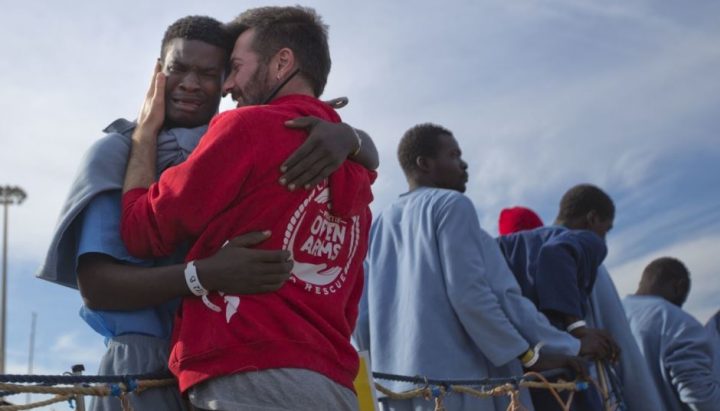How should we react to the closure of Italian and Maltese ports, to the criminalisation of solidarity and to the misrepresentation of facts? We speak to Riccardo Gatti, the Captain of the Astral and Head of Mission of the Open Arms, the boats that belong to the Spanish NGO Proactiva Open Arms.
Where are Proactiva Open Arms’ boats currently?
Both the Astral and the Open Arms are docked in the port of Barcelona. Things have changed drastically in the last few months, and we have been forced to take the temporary step of leaving the waters of the central Mediterranean. This is due to the closure of Italian and Maltese ports and the ban against not only disembarking migrants rescued at sea but also transferring them to larger boats than ours. The Open Arms is a former tugboat and the Astral is a sailing ship and, despite them having saved thousands of people, they are not fit to stay at sea for days on end, especially now that autumn is approaching. The risk to people’s safety would be too great. Previously you would wait for 1-2 days at most to disembark. Now, as a result of the aggressive campaign against the NGOs, it can take up to 10 days. They have succeeded in removing us all from the search and rescue area and the ports are closed even to the Italian Coast Guard.
The temporary suspension of our operations in the central Mediterranean means that we will no longer be able to carry out our work of reporting on what is happening to the migrants at sea and in the Libyan detention centres. We are sure that many people are currently leaving Libya and, without boats to help them, we can only guess at how many of them will die.
Due to this situation, the flow of arrivals to Spain has increased. Some months ago, we made a proposal to the Spanish Government to help them in their relief operations, but at the time we were told that there was no need. They have now accepted our offer and we are planning to depart as soon as possible. The Open Arms will go towards the Strait of Gibraltar and the Astral to the central Mediterranean to continue our reporting and observation of human rights violations at sea.
Whatever happens, we won’t surrender. We are in contact with other NGOs to find ways that we can collaborate and support each other, and we are trying to find a solution that will allow us to resume our operations in the central Mediterranean.
How can individuals and organisations that believe in solidarity and human rights and independent journalism help you?
The first and most tangible form of help comes from the donations that enable us to continue our work and which, fortunately, have not stopped.
One other fundamental point is the circulation of accurate information to counter the huge misrepresentation of what is really happening, fake news and the media campaign which started two years ago against the NGOs. It is now well-known what is happening in Libya, the conditions of the people who succeed in surviving the journey, the detention camps and the sea-crossing. We need to keep reporting on all of this and oppose the widespread xenophobic and racist speeches.
Finally, several journalists, members of Parliament and celebrities spent time on our boats during our most recent missions. I’d like to launch an appeal for more to join us. Their influence and giving them the opportunity to report on and bear witness to what is really happening can make a big contribution to building awareness and giving migrants and volunteers a voice.
The criminalisation of solidarity has increased, with investigations and boats sequestered, efforts to discredit you and violently-worded attacks from the Italian government. How has this made you feel?
We knew from the very start that lies and absurd, dangerous accusations were being used against us. This gave us conviction in what we were doing and helped us continue our work without wasting energy listening to people like Luigi Di Maio who called us a “taxi at sea.” We also know that when the establishment wants to stop something, it uses all the means at its disposal, starting with the misrepresentation of actual events.
You have been present in many dramatic situations. What goes through your mind in those moments?
A great deal of anger and sorrow; those who die at sea are not victims of a natural disaster. Their deaths could be avoided with more efficient aid, humanitarian corridors and so on. If those on board the Diciotti had simply been shipwrecked and saved from a cruise ship rather than being migrants, you can be sure that they wouldn’t have received such shameful treatment. Instead these were weak and traumatised people, escaping from the horrors of Libya, in need of medical and psychological assistance.
There is a huge amount being done to make migrants invisible, and to stop them from setting out. Every time we depart on our missions, we don’t know what we are going to find.
Nevertheless, I am seeing some positive signs. More and more people are taking action against this racist and xenophobic trend. Some of these people, angry at the news that we are leaving the central Mediterranean, have contacted us to say: “You can’t leave!”
What gives you the strength to go on?
Every life saved repays all my effort and all the difficulties we have overcome. It reminds me that this is all about people, and that every life counts. I draw strength from the attacks made on us. They don’t frustrate me, because they are violating not only migrants’ rights, but the rights of Italians, especially to accurate information.
Translation from Italian by Malcolm Gilmour










